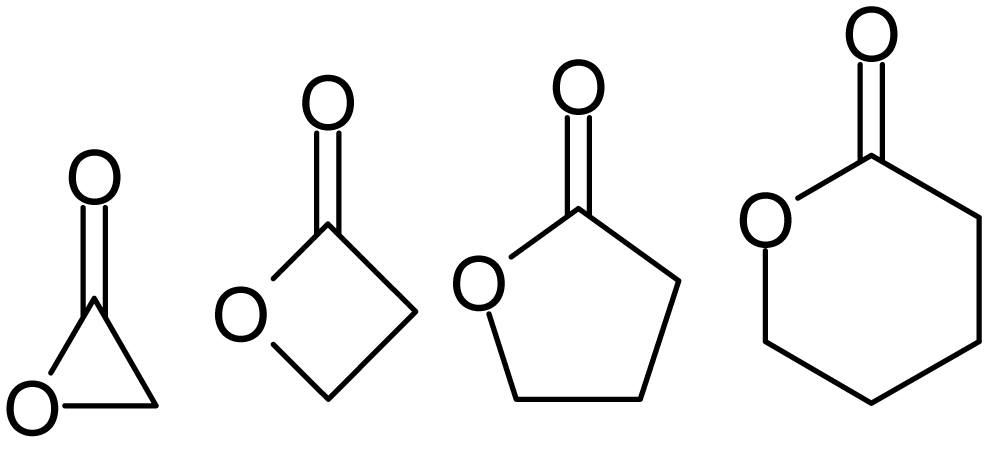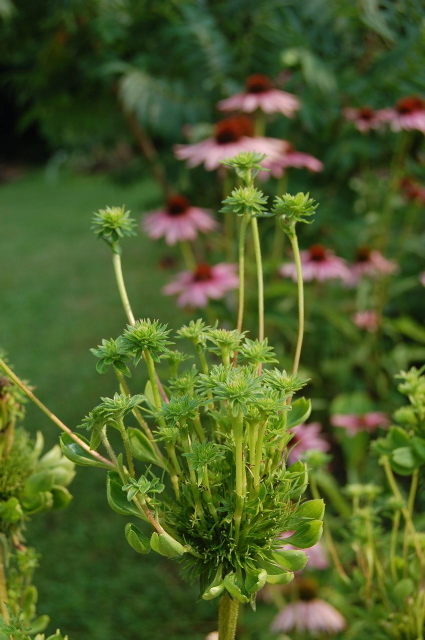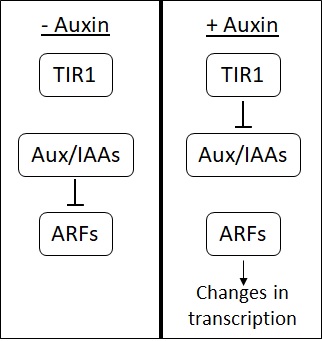|
Gibberelic Acid
Gibberellic acid (also called gibberellin A3, GA, and GA3) is a Plant hormone, hormone found in plants and fungi. Its chemical formula is C19H22O6. When purified, it is a white to pale-yellow solid. Plants in their normal state produce large amounts of GA3. It is possible to produce the hormone industrially using microorganisms.Camara, M. C. et al (2015) General Aspects and Applications of Gibberelins and Gibberellic Acid in Plants. In: Hardy, J.. (Org.). Gibberellins and Gibberellic Acid: Biosynthesis, Regulation and Physiological Effects. 1ed.Hauppauge: Nova Science Publishers, 2015, v., p. 1-21. Gibberellic acid is a simple gibberellin, a Polycyclic compound, pentacyclic diterpene acid promoting growth and elongation of cells. It affects decomposition of plants and helps plants grow if used in small amounts, but eventually plants develop tolerance to it. GA stimulates the cells of germinating seeds to produce messenger RNA, mRNA molecules that code for Hydrolase, hydrolytic en ... [...More Info...] [...Related Items...] OR: [Wikipedia] [Google] [Baidu] |
Plant Hormone
Plant hormone (or phytohormones) are signal molecules, produced within plants, that occur in extremely low concentrations. Plant hormones control all aspects of plant growth and development, from embryogenesis, the regulation of organ size, pathogen defense, stress tolerance and through to reproductive development. Unlike in animals (in which hormone production is restricted to specialized glands) each plant cell is capable of producing hormones. Went and Thimann coined the term "phytohormone" and used it in the title of their 1937 book. Phytohormones occur across the plant kingdom, and even in algae, where they have similar functions to those seen in higher plants. Some phytohormones also occur in microorganisms, such as unicellular fungi and bacteria, however in these cases they do not play a hormonal role and can better be regarded as secondary metabolites. Characteristics The word hormone is derived from Greek, meaning ''set in motion''. Plant hormones affect gene ex ... [...More Info...] [...Related Items...] OR: [Wikipedia] [Google] [Baidu] |
Okanagan
The Okanagan ( ), also known as the Okanagan Valley and sometimes as the Okanagan Country, is a region in the Canadian province of British Columbia defined by the basin of Okanagan Lake and the Canadian portion of the Okanagan River. It is part of the Okanagan Country, extending into the United States as Okanogan County in north-central Washington. According to the 2016 Canadian census, the region's population is 362,258. The largest populated cities are Kelowna, Penticton, Vernon, and West Kelowna. The region is known for its sunny climate, dry landscapes and lakeshore communities and particular lifestyle. The economy is retirement and commercial-recreation based, with outdoor activities such as boating and watersports, skiing and hiking. Agriculture has been focused primarily on fruit orchards, with a recent shift in focus to vineyards and wine. The region stretches northwards via the Spallumcheen Valley to Sicamous in the Shuswap Country, and reaches south of the Canada–U ... [...More Info...] [...Related Items...] OR: [Wikipedia] [Google] [Baidu] |
Lactones
Lactones are cyclic carboxylic esters, containing a 1-oxacycloalkan-2-one structure (), or analogues having unsaturation or heteroatoms replacing one or more carbon atoms of the ring. Lactones are formed by intramolecular esterification of the corresponding hydroxycarboxylic acids, which takes place spontaneously when the ring that is formed is five- or six-membered. Lactones with three- or four-membered rings (α-lactones and β-lactones) are very reactive, making their isolation difficult. Special methods are normally required for the laboratory synthesis of small-ring lactones as well as those that contain rings larger than six-membered. Nomenclature Lactones are usually named according to the precursor acid molecule (''aceto'' = 2 carbon atoms, ''propio'' = 3, ''butyro'' = 4, ''valero'' = 5, ''capro'' = 6, etc.), with a ''-lactone'' suffix and a Greek letter prefix that specifies the number of carbon atoms in the heterocycle — that is, the distance between the relevant -OH ... [...More Info...] [...Related Items...] OR: [Wikipedia] [Google] [Baidu] |
Tertiary Alcohols
In chemistry, an alcohol is a type of organic compound that carries at least one hydroxyl () functional group bound to a saturated carbon atom. The term ''alcohol'' originally referred to the primary alcohol ethanol (ethyl alcohol), which is used as a drug and is the main alcohol present in alcoholic drinks. An important class of alcohols, of which methanol and ethanol are the simplest examples, includes all compounds which conform to the general formula . Simple monoalcohols that are the subject of this article include primary (), secondary () and tertiary () alcohols. The suffix ''-ol'' appears in the IUPAC chemical name of all substances where the hydroxyl group is the functional group with the highest priority. When a higher priority group is present in the compound, the prefix ''hydroxy-'' is used in its IUPAC name. The suffix ''-ol'' in non-IUPAC names (such as paracetamol or cholesterol) also typically indicates that the substance is an alcohol. However, some compound ... [...More Info...] [...Related Items...] OR: [Wikipedia] [Google] [Baidu] |
Plant Hormones
Plant hormone (or phytohormones) are signal molecules, produced within plants, that occur in extremely low concentrations. Plant hormones control all aspects of plant growth and development, from embryogenesis, the regulation of organ size, pathogen defense, stress tolerance and through to reproductive development. Unlike in animals (in which hormone production is restricted to specialized glands) each plant cell is capable of producing hormones. Went and Thimann coined the term "phytohormone" and used it in the title of their 1937 book. Phytohormones occur across the plant kingdom, and even in algae, where they have similar functions to those seen in higher plants. Some phytohormones also occur in microorganisms, such as unicellular fungi and bacteria, however in these cases they do not play a hormonal role and can better be regarded as secondary metabolites. Characteristics The word hormone is derived from Greek, meaning ''set in motion''. Plant hormones affect gene expres ... [...More Info...] [...Related Items...] OR: [Wikipedia] [Google] [Baidu] |
Auxin
Auxins (plural of auxin ) are a class of plant hormones (or plant-growth regulators) with some morphogen-like characteristics. Auxins play a cardinal role in coordination of many growth and behavioral processes in plant life cycles and are essential for plant body development. The Dutch biologist Frits Warmolt Went first described auxins and their role in plant growth in the 1920s. Kenneth V. Thimann became the first to isolate one of these phytohormones and to determine its chemical structure as indole-3-acetic acid (IAA). Went and Thimann co-authored a book on plant hormones, ''Phytohormones'', in 1937. Overview Auxins were the first of the major plant hormones to be discovered. They derive their name from the Greek word αυξειν (''auxein'' – "to grow/increase"). Auxin is present in all parts of a plant, although in very different concentrations. The concentration in each position is crucial developmental information, so it is subject to tight regulation through both meta ... [...More Info...] [...Related Items...] OR: [Wikipedia] [Google] [Baidu] |
Gibberellin
Gibberellins (GAs) are plant hormones that regulate various developmental processes, including stem elongation, germination, dormancy, flowering, flower development, and leaf and fruit senescence. GAs are one of the longest-known classes of plant hormone. It is thought that the selective breeding (albeit unconscious) of crop strains that were deficient in GA synthesis was one of the key drivers of the "green revolution" in the 1960s, a revolution that is credited to have saved over a billion lives worldwide. History The first inroads into the understanding of GAs were developments from the plant pathology field, with studies on the ''bakanae'', or "foolish seedling" disease in rice. Foolish seedling disease causes a strong elongation of rice stems and leaves and eventually causes them to topple over. In 1926, Japanese scientist Eiichi Kurosawa identified that foolish seedling disease was caused by the fungus ''Gibberella fujikuroi.'' Later work at the University of Tokyo sho ... [...More Info...] [...Related Items...] OR: [Wikipedia] [Google] [Baidu] |
Abscisic Acid
Abscisic acid (ABA) is a plant hormone. ABA functions in many plant developmental processes, including seed and bud dormancy, the control of organ size and stomatal closure. It is especially important for plants in the response to environmental stresses, including drought, soil salinity, cold tolerance, freezing tolerance, heat stress and heavy metal ion tolerance. In plants Function ABA was originally believed to be involved in abscission, which is how it received its name. This is now known to be the case only in a small number of plants. ABA-mediated signaling also plays an important part in plant responses to environmental stress and plant pathogens. The plant genes for ABA biosynthesis and sequence of the pathway have been elucidated. ABA is also produced by some plant pathogenic fungi via a biosynthetic route different from ABA biosynthesis in plants. In preparation for winter, ABA is produced in terminal buds. This slows plant growth and directs leaf primordia to devel ... [...More Info...] [...Related Items...] OR: [Wikipedia] [Google] [Baidu] |
Malting
Malting is the process of steeping, germinating and drying grain to convert it into malt. The malt is mainly used for brewing or whisky making, but can also be used to make malt vinegar or malt extract. Various grains are used for malting, most often barley, sorghum, wheat or rye. Several types of equipment can be used to produce the malt. Traditional floor malting germinates the grains in a thin layer on a solid floor, and the grain is manually raked and turned to keep the grains loose and aerated. In a modern malt house the process is more automated, and the grain is germinated on a floor that is slotted to allow air to be forced through the grain bed. Large mechanical turners, e.g., Saladin boxes, keep the much thicker bed loose with higher productivity and better energy efficiency. Intake The grain is received at the malt house from the farmer. It is taken in from the field and cleaned (dressed), and dried if necessary, to ensure the grain remains in the best condition ... [...More Info...] [...Related Items...] OR: [Wikipedia] [Google] [Baidu] |
Plant Hormone
Plant hormone (or phytohormones) are signal molecules, produced within plants, that occur in extremely low concentrations. Plant hormones control all aspects of plant growth and development, from embryogenesis, the regulation of organ size, pathogen defense, stress tolerance and through to reproductive development. Unlike in animals (in which hormone production is restricted to specialized glands) each plant cell is capable of producing hormones. Went and Thimann coined the term "phytohormone" and used it in the title of their 1937 book. Phytohormones occur across the plant kingdom, and even in algae, where they have similar functions to those seen in higher plants. Some phytohormones also occur in microorganisms, such as unicellular fungi and bacteria, however in these cases they do not play a hormonal role and can better be regarded as secondary metabolites. Characteristics The word hormone is derived from Greek, meaning ''set in motion''. Plant hormones affect gene ex ... [...More Info...] [...Related Items...] OR: [Wikipedia] [Google] [Baidu] |

.jpg)




